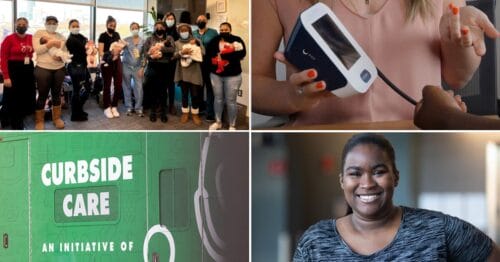Could Gabby Be Preconception Care's New Best Friend?
September 11, 2020

Getty Images
Clinical trials of Gabby, a digital conversation agent, found it increased Black women's engagement in care known to improve birth outcomes.
Researchers are paying close attention to preconception care, or care that addresses health risks before a woman becomes pregnant, as an approach to reducing racial disparities in pregnancy and birth outcomes.
It is well established that mitigating an array of health risks by the time of conception can have profound and enduring effects on the health of the woman and her newborn, including the long-term health of the child into adulthood. However, in the United States, Black women still have more than twice the risk of delivering a low-birthweight infant and four times the risk of maternal mortality compared to white women.
“There is an overarching need to test new interventions in this high-risk population of women,” says Brian Jack, MD, a family medicine physician at Boston Medical Center and director of the Boston University Center for Health System Design & Implementation. Prenatal care comes too late to impact the most critical time of embryonic development, especially for women who enter pregnancy with pre-existing conditions that could impact the health of both mother and baby, including physical and behavioral health conditions, exposure to risky medications or environmental conditions, genetic disorders, substance use disorder, unhealthy diet or weight, domestic abuse, or other concerns.
While the benefits of addressing these risks in preconception care are understood, less is known about the best approaches for reaching patients with the information they need.
Published in The Lancet Digital Health, new findings from Jack and co-authors show that delivering simulated care using an online health technology system helped women address their individual risks more than control approaches did.
Researchers used health information technology called Gabby to help communicate key health messages to overcome barriers to providing health education and counseling. The randomized trial included 528 women aged 18–34 who self-identified as African American or Black and not pregnant, from 35 states around the United States. Of them, 262 women were provided with access to Gabby, which assessed 102 preconception risks and delivered 12 months of tailored dialogue using synthesized speech, nonverbal behavior, visual aids, and health behavior change techniques. The control group received a letter listing their preconception risks and encouraging them to talk with a clinician, how many women currently receive preconception care.
“A digital conversation agent like Gabby allows for 24/7 access to accurate health information delivered through interactive dialogue based on best clinical practices.”
Gabby — an “embodied conversational agent” with computer-generated characters — simulates face-to-face conversation, allowing women to select the risks they want to discuss, learn more about the importance of preconception health, and listen to advice on how to take action. By interacting with women to identify progress, give feedback, and assess readiness, Gabby creates a customizable list of identified preconception care risks to assist in tracking progress. The online tool increased the rate of maintaining and acting on identified preconception care risks by 16% after six months compared to the control group. The results were maintained after 12 months.
“We wanted to create a way for patients to take control of their health outside of the doctor’s office,” says Jack. “A digital conversation agent like Gabby allows for 24/7 access to accurate health information delivered through interactive dialogue based on best clinical practices.”
It is an important finding that a health information technology system can help reduce risks during the preconception period, says Jack, and that it was successful in a multisite trial. Scalable health information technology like Gabby could be used as a population health tool to assist health systems in delivering preconception care to eligible women. It could also be used to assist clinicians by collecting data ahead of visits, informing patients of risks, improving patient-centered discussions, and directly addressing clinician time restraints.


